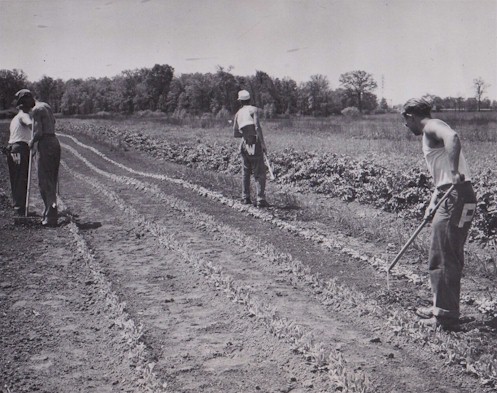When Potato Fields were Prisons - Apr 5, 2020 Podcast
When Potato Fields were Prisons - Apr 5, 2020 Podcast
-
-
-
-
-
When Potato Fields were Prisons - Apr 5, 2020 Podcast
-
Post #1 - March 12th, 2020, 8:54 pmChicago Foodways Roundtable
When Potato Fields were Prisons Unfree Farm Labor in McHenry WW2
Presented Samuel Klee, Ph.D. candidate
(Program in conjunction with the Highland Park Historical Society)
German prisoners of war stationed at Fort Sheridan, ILL. raise their own vegetables on a four-acre tract of land at the fort where they have own camp including auto repair garage, and facilities for cabinetmaking, painting, electrical repairs and general labor. June 1, 1944 (Signal Corps photo)
During World War II, some farmers in Marengo, Illinois negotiated with a large food corporation and federal agencies to make local farm fields into restricted, prison-like spaces. When the Curtiss Candy Company brought Japanese-Americans from the Tule Lake Internment Camp in California to cultivate and pick potatoes in 1943, the Marengo community struggled with the federal government and the candy company to eliminate the outsiders’ presence.
Weighing civic commitments, religious principles, and environmental necessities against racial fears, Marengo ultimately allowed Japanese-Americans to remain and work under surveillance and restriction. Later in 1943, they were joined by German prisoners of war who were formally incarcerated under military guard at nearby Camp Grant. Marengo’s wartime food system remained carceral, or prison-like, for the war’s duration.
Prison farms in a war for freedom may seem ironic, but agricultural communities across the country shared Marengo’s experience. In the Midwest, fields, packing sheds, and canneries received and used several unfree labor groups, including Japanese-Americans, German and Italian prisoners of war. While using federal programs, each receiving community negotiated their own forms of unfreedom on the land. Local and national newspapers, federal archives and published oral history interviews provided the basis for this presentation.
Samuel Klee is a Ph.D. candidate in American History at Saint Louis University. His dissertation, “Caging Cultivators: Carceral Labor Landscapes in American Agriculture during World War II,” examines farms that functioned like prisons for Japanese-Americans and European prisoners of war in the American Midwest. His teaching and research interests range from environmental world history and carceral state studies to education policy.
Sunday, April 5, 2020 at 2:00 PM
This talk will be done virtually over ZOOM.
If you wish to participate, then please email for a link to: [email protected]
All are welcome!
Directions and parking
No fees. No food samples will be served.
https://culinaryhistorians.org/Cathy2
"You'll be remembered long after you're dead if you make good gravy, mashed potatoes and biscuits." -- Nathalie Dupree
Facebook, Twitter, Greater Midwest Foodways, Road Food 2012: Podcast
-
-
Post #2 - March 13th, 2020, 11:51 pmI saw this speaker present last year at the Midwestern History Association conference, and he was one of my favorite speakers of the event. The info is interesting and not stuff most people know -- and the speaker is tremendously engaging and enthusiastic. If you can see it, it's definitely worth your while. At least if you have any interest at all in food or history."All great change in America begins at the dinner table." Ronald Reagan
http://midwestmaize.wordpress.com
-
-
Post #3 - March 14th, 2020, 7:16 amCynthia wrote:I saw this speaker present last year at the Midwestern History Association conference, and he was one of my favorite speakers of the event. The info is interesting and not stuff most people know -- and the speaker is tremendously engaging and enthusiastic. If you can see it, it's definitely worth your while. At least if you have any interest at all in food or history.
Cynthia and I were perhaps the first people he had met who had been to Marengo.
The McHenry Historical Society will host this program:A $12 donation is requested for this and the remaining two programs in the society’s 34th annual Sampler Lecture Series at the county history museum. They are:
• When Potato Fields were Prisons: Unfree Agriculture in McHenry County during World War II. Join Sam Klee, a doctorate candidate at Saint Louis University and a member of the adjunct history faculty at St. Louis Community College, at 4 p.m. Monday, April 6. Klee discusses a little known aspect of World War II: the forced labor of interred Japanese and – later – German prisoners of war, in the potato fields around Marengo and across the Midwest.
For information, call 815-923-2267 or visit http://www.gothistory.org.te]Cathy2
"You'll be remembered long after you're dead if you make good gravy, mashed potatoes and biscuits." -- Nathalie Dupree
Facebook, Twitter, Greater Midwest Foodways, Road Food 2012: Podcast
-
-
Post #4 - April 3rd, 2020, 8:20 amHI,
This talk will be done virtually over ZOOM.
If you wish to participate, then please email for a link to: [email protected]
Thanks!
Cathy2Cathy2
"You'll be remembered long after you're dead if you make good gravy, mashed potatoes and biscuits." -- Nathalie Dupree
Facebook, Twitter, Greater Midwest Foodways, Road Food 2012: Podcast
-
-
Post #5 - May 29th, 2020, 7:13 pmPodcast on
When Potato Fields were Prisons Unfree Farm Labor in McHenry WW2
Presented by Samuel Klee, PhD Candidate
***
From 2008 until mid-2013, Culinary Historians programs were recorded by WBEZ via Chicago Amplified. Since then, we have recorded our programs hosted on soundcloud.
You can find a list here.
We are also on:
Google Play
iHeartRadio
Apple Podcast
rss feed
RadioPublic
SoundCloud
Spotify
Stitcher
These run the length of an introduction plus presentation with questions, but no food samples. Cathy2
Cathy2
"You'll be remembered long after you're dead if you make good gravy, mashed potatoes and biscuits." -- Nathalie Dupree
Facebook, Twitter, Greater Midwest Foodways, Road Food 2012: Podcast

